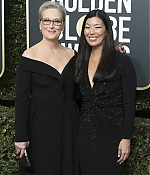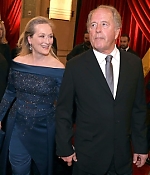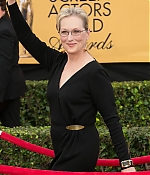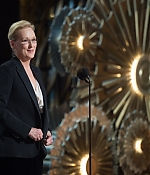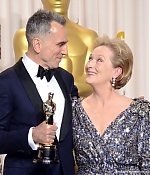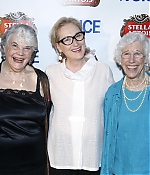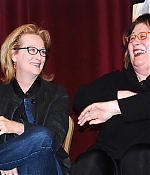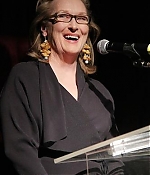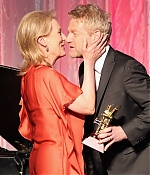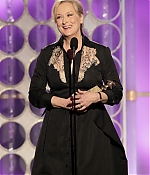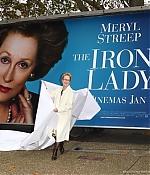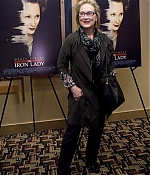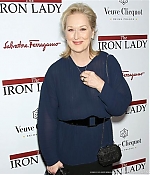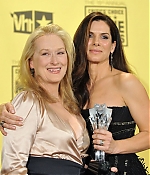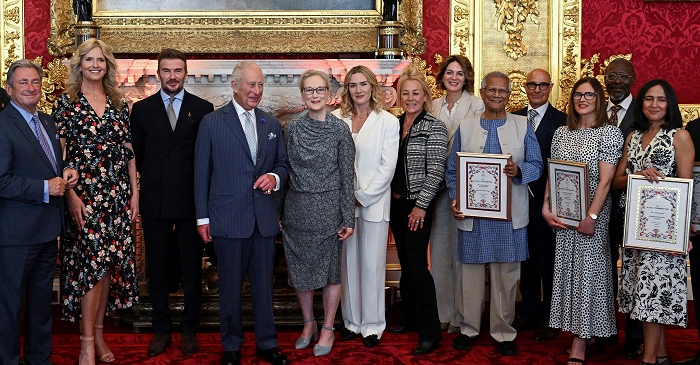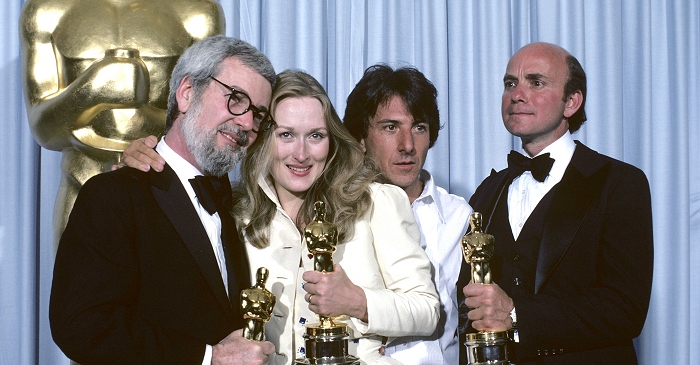|
Simply Streep is your premiere online resource on Meryl Streep's work on film, television and in the theatre - a career that has won her acclaim to be one of the world's greatest living actresses. Created in 1999, Simply Streep has built an extensive collection over the past 25 years to discover Miss Streep's body of work through thousands of photographs, articles and video clips. Enjoy your stay and check back soon.
|
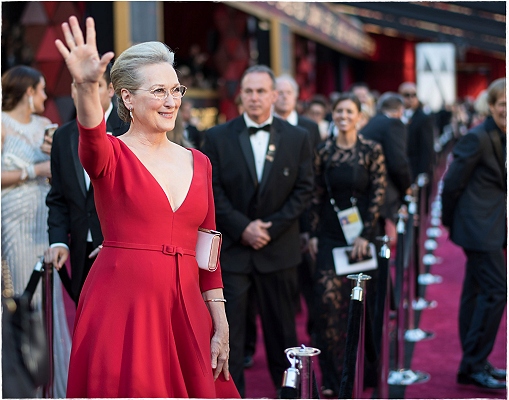
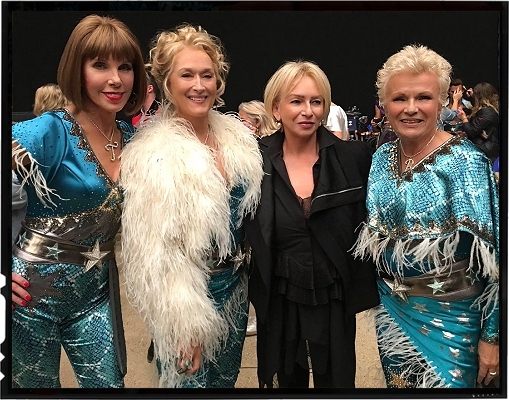
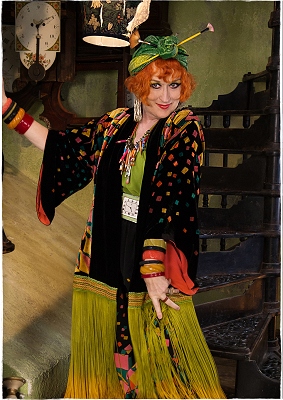
Early 2018 saw the wide theatrical release of “The Post” in the United States and around the world. Meryl Streep picked up a Lead Actress award from the National Board of Review and was nominated for almost all major acting awards, including the Golden Globes, Critics Choice, and Academy Awards. But in early 2018, Hollywood had other topics on its mind: In October 2017, The New York Times and The New Yorker reported that dozens of women had accused the American film producer Harvey Weinstein of rape, sexual assault and sexual abuse over a period of at least 30 years. It was the birth of #Metoo in Hollywood. Weinstein was eventually convicted for a number of his crimes and imprisoned. As several of her films were distributed by the Weinstein Company, including “The Iron Lady” in 2012 and “August: Osage County” in 2013, Streep gabe the New York Times and interview in January of 2018: “It really underlined my own sense of cluelessness, and also how evil, deeply evil, and duplicitous, a person he was, yet such a champion of really great work. You make movies. You think you know everything about everybody. So much gossip. You don’t know anything. People are so inscrutable on a certain level. And it’s a shock. Some of my favorite people have been brought down by this, and he’s not one of them.”
I think that people are aware now of a power imbalance and it’s something that leads to abuse. It’s led to abuse in our own industry, and it’s led to abuse across domestic workers’ field of work. It’s in the military, it’s in Congress, it’s everywhere and we want to fix that. We feel sort of emboldened in this particular moment to stand together in a thick black line dividing then from now. (Meryl Streep, E! News, January 07, 2018)
With a Best Picture nomination for “The Post” at the Academy Awards, Meryl Streep would be part of two more very successful motion pictures in 2018, although only in cameo appearances. She reprised on of her most beloved performances as Donna Sheridan in the surprising sequel/prequel “Mamma Mia! Here We Go Again”, which released theaters in July. With the original cast returning and a host of new talents playing their younger versions, fans were disappointed to learn, that, of all people, Donna Sheridan was dead. She appears by the end of the film, singing “My Love, My Life” to Sophie during her young child’s christening.
It’s a comedy where you actually experience loss. That’s what we’ve done with the Meryl character. Life is… you know, a bitch. We could only really move ahead with the sequel if we knew that Meryl was going to be part of it because she’s so much part of the first film. She doesn’t jump up and down at the idea of doing sequels; she’s an actress that likes to kind of make new experiences and challenges. For the first one, she’s in great sections and all that, And then if she was going to sing [in the sequel], what was it going to be? Because this time around, she’s not going to be running and jumping off roofs. So it had to be something different and it’s an incredibly affecting, key moment. (Judy Craymer, Marie Claire, October 21, 2018).
Director Ol Parker said in the same interview: “Meryl is incredibly proud of the first film, so she wanted to be in it, but she wanted it to be impactful. And she clearly wasn’t going to be in it for the whole movie. So I was the one that said, I think she should be dead. I think you should make a movie about getting over loss, overcoming something, and standing up and becoming yourself, and arising from the ashes of grief. So we then talked about that with Meryl, who was totally into it and excited by it. So then I went ahead and wrote the script on that basis. And then when we sent it out to everyone, Meryl was already in, which was amazing. So [the rest of the cast] all read it knowing that Meryl has already approved it and was excited to be in it. So people were saying yes immediately. It wasn’t forced on me. I was just trying to find the most dramatic and impactful story that I could find to tell.”
In December, she had a scene as Cousin Topsy in Rob Marshall’s “Mary Poppins Returns”, a sequel to the 1964 classic starring Julie Andrews and Dick van Dyke. Topsy, played with an Eastern European/Slavic accent, performs a song and dance number called “Turning Turtle”, in which she compares herself to a turtle who has been flipped onto its back and is unable to function until someone comes along and rescues it. The musical was chosen by both the National Board of Review and American Film Institute as one of the top ten films of 2018 and received numerous award nominations, four Academy Award nominations for Best Original Score, Best Original Song (“The Place Where Lost Things Go”), Best Production Design, and Best Costume Design.

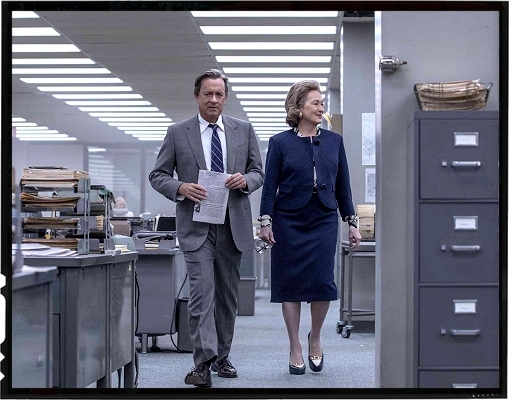
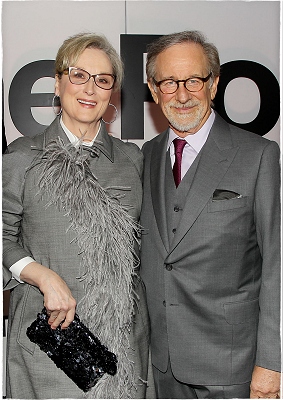
In January, Meryl Streep received the Golden Globe’s Cecil B. DeMille Award. After a heartfelt introduction by Viola Davis, Streep chose to speak about one topic and one topic only – Donald Trump’s treatment of freedom of speech, freedom of press and his treatment of disabled people. Trump was elected President for only two months, and Streep was the first actor in Hollywood to not only speak about the election, but criticize his actions (which, in hindsight, was only the beginning). She received much applause from her Hollywood peers, and was at the receiving end of endless online harrassment by Trump supporters – and even the President himself, calling Streep a “most-overrated actress”. The Streep-treatment, as I like to call it was a watershed moment on the one hand, and a clear sign towards Hollywood actors to not play with fire if they want to sell movies. As celebrated as Streep was for speaking her mind, not many have followed her way to endanger their income by speaking their minds. In the end, Hollywood had to suffer a much bigger blow by the end of the year when The New York Times published explosive allegations against Harvey Weinstein, sending an avalanche through the industry and creating what might be the biggest achievement of this decade for women in the workplace – more on that in the chronology for 2018. Streep spoke about the sudden focus on her political thoughts at the National Ally For Equality Award by the Human Rights Campaign in February:
I am the most overrated and the most overdecorated… and currently I am the most over-berated actress. The weight of all my art is part of what brings me here to the podium. It compels me. It’s against every one of my natural instincts, which is to stay the fuck home. (Meryl Streep, February 11, 2017)
In what has been a whirlwind in the last three years of this decade, Streep pulled out maybe her best performance of the last 10 years in Steven Spielberg’s “The Post”. Spielberg read the screenplay and decided to direct the film as soon as possible, citing that “when I read the first draft of the script, this wasn’t something that could wait three years or two years — this was a story I felt we needed to tell today.” Chris Nashawaty wrote in Entertainment Weekly: “The beauty of Streep’s performance (and it’s one of her best in years) is how she lets you see her grow into the responsibility of her position. She elevates The Post from being a First Amendment story to a feminist one, too. Spielberg makes these crucial days in American history easy to follow. But if you look at The Post next to something like All the President’s Men, you see the difference between having a story passively explained to you and actively helping to untangle it. That’s a small quibble with an urgent and impeccably acted film. But it’s also the difference between a very good movie and a great one.” “The Post” started filming in May 2017 and was released by December of the same year! Both Hanks and Streep received critical acclaim for their performances. The film received two Academy Award nominations for Best Picture and Best Actress.
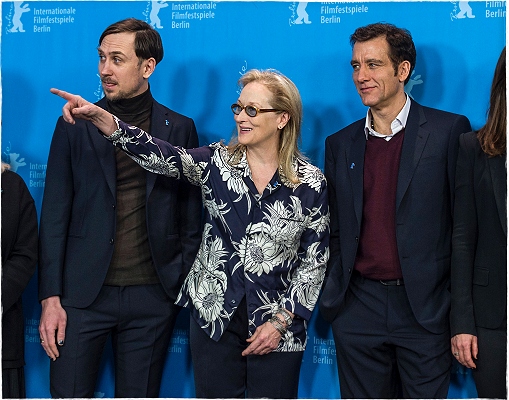

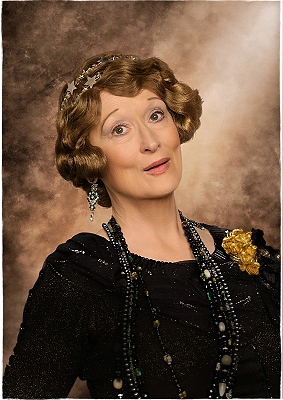
While Meryl Streep has been a rather steady guest to film festivals around the world (including two following in 2016), she has never served on the jury of any film festival. In February of 2016, she became the Berlinale International Film Festival’s jury president. During the press conference, Streep said she was proud to head the seven-member, majority-female jury which includes German actor Lars Eidinger, British film critic Nick James, French photographer Brigitte Lacombe, British actor Clive Owen, Italian actress Alba Rohrwacher and Polish director Malgorzata Szumowska. “This jury is evidence that at least women are included and in fact, dominate this jury, and that’s an unusual situation in bodies of people who make decisions,” Streep said. “I have absolutely no idea how to run a jury, but I’ve been the boss of other enterprises, my family and various other things. So I’m going to learn by doing. We’re human beings, and film is an emotional experience so we’re going to make these decisions based on what our heads want to say.”
In August, Meryl Streep delivered another star-turn in Stephen Frears’ eponymous biopic about opera singer Florence Foster Jenkins. A wealthy New York heiress, Jenkins attempted to become an opera singer in the 1940s despite her horrible singing voice. An injury in her youth deterred that dream. So she sets out to sing her way to Carnegie Hall knowing the only way to get there would be practice practice practice. Her husband supports her venture and the true story of Florence Foster Jenkins playing Carnegie Hall becomes a truly historic event. Working with director Stephen Frears was a no-brainer for Streep. “I said yes without reading the script,” she told the SAG/Aftra conversation panel in August. “Stephen Frears I always wanted to work with. He’s such a great director. We circled that possibility before over the years, but it never worked out, so it was great that he called me and said, ‘I have something for you’ and I said ‘Great. Yes. I’ll do it'”. Frears has a history of bringing strong woman characters to the screen, including Judi Dench’s “Philomena” and Helen Mirren’s Academy Award winning performance as “The Queen”, and “Florence Foster Jenkins” fits right in.
I think we all think we sound really good in the shower, where there’s that nice reverb and the water’s drowning you out and there is some liberation in the freedom of being totally alone and really going for it. I did hear a recording – I believe it was Irving Berlin – playing and singing along to his own music, and the piano playing was wonderful. The singing, however, was not. It was circling the notes that we knew presumably were in his head, but he wasn’t hitting the pitches. It was sort of amazing. He meandered around the pitches – and I kept thinking: But he’s such a genius, he must know what it should sound like. So maybe this was part of Florence’s inability to hear herself. Or it could be because she had physical challenges that involved tinnitus, this thing in your ear, because she was ill. Who knows? Who knows what she heard. I do know that we have delusions about ourselves and what we sound like. (Meryl Streep, NPR Fresh Air, August 10, 2016)
For the film, a massive press tour was held in the United States and internationally. After the premiere in Frears’ home town London, Streep and cast promoted the film during various conversation panels and screenings in New York and Los Angeles before traveling to Italy for the 11th Rome International Film Festival and, in October, the Tokyo Film Festival. The film was a modest box office success and embraced by critics. Anthony Lane of the New Yorker wrote, “Streep is right there, solidly invested in the folly of Florence’s dreams. When she declares that “music has been, and is, my life,” you believe her.” By the end of the year, Meryl Streep received another round of nominations for the Golden Globe, Screen Actors Guild Award, BAFTA Film Award and Academy Award in the following year.

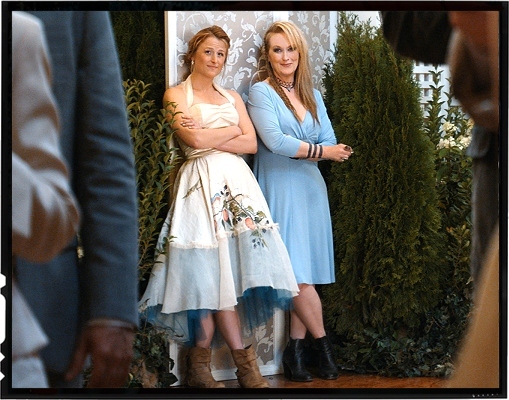
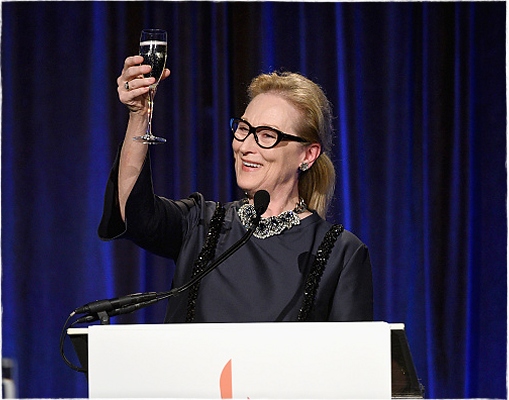
In 2015, Streep starred in Jonathan Demme’s “Ricki and the Flash”, playing a grocery store checkout worker by day who is a rock musician at night, and who has one last chance to reconnect with her estranged family. The film was written by Diablo Cody, who won an Academy Award for writing “Juno”, and who says her inspiration for the character Ricki came from her own life. “My husband’s mom is actually the lead singer of a cover band on the Jersey Shore,” Cody tells NPR’s Rachel Martin. “And the thing that was striking to me when I met her was nobody had prepped me for that — so I was expecting to meet your typical mother-in-law, and then that night we go to see a show of hers, and she’s standing on the bar singing.” That was the spark for the character at the center of the film, Ricki Rendazzo, played by Streep. Ricki lives in LA, estranged from her three kids, who live in Indiana. At its core, this film is about family. To pursue her dream, Ricki left her husband and children behind; a family crisis finally takes her home, where her daughter is struggling with her own divorce. Streep learned to play the guitar for the semi-autobiographical dramedy film, which reunited her with her eldest daughter Mamie Gummer. Reviews of the film were generally mixed but favorable. The New Yorker wrote: “Demme is unrivalled at filming bands at play – and at noticing the folks who listen and dance along – and Streep’s part is worthy of her formidable gifts. Her singing has an edge of urgency to it, and a secure hold on the emotional form of the movie. The happy ending, for once, feels thoroughly earned.”
Streep’s other film of the year was director Sarah Gavron’s period drama “Suffragette”. The drama tells the story of the militant campaign in support of women’s voting rights in the UK, and features Carey Mulligan as a laundress called Maud Watts, a fictional working-class character whose struggle is the centre of the drama. “Suffragette” also features Helena Bonham Carter as Edith Ellyn, an amalgamation of more than one prominent suffragette, and Natalie Press as Emily Davison, the activist who died at the 1913 Epsom Derby. Streep plays the small but pivotal role of Emmeline Pankhurst, a British political activist and leader of the British suffragette movement who helped women win the right to vote. Pankhurst founded the Women’s Social and Political Union, which used militant tactics to agitate for women’s suffrage. She was imprisoned many times, but supported the war effort after World War I broke out. Parliament granted British women limited suffrage in 1918. Pankhurst died before women were given full voting rights.
Men should look at the world as if something is wrong when their voices predominate. They should feel it. People at agencies and studios, including the parent boards, might look around the table at the decision-making level and feel something is wrong if half their participants are not women. Because our tastes are different, what we value is different. Not better, different. (Meryl Streep, Time Out, September 28, 2015)
In accordance with its powerful themes of gender struggle, empowerment and solidarity, the production has also made much of its female-dominated creative team, led by director Sarah Gavron and scriptwriter Abbie Morgan, whose film work includes “The Iron Lady”, “Shame” and “The Invisible Woman”. Gavron said that the cast and crew had formed “an immediate bond”. “There was an unusual sense of camaraderie, partly it was because we were telling a story everybody felt very passionate about, but also because there was an unusual balance: we had men, and we had women, in key positions, and that was exciting,” Gavron said during the film’s world premiere at the London Film Fesitval. The film-makers explained their decision to focus on a peripheral figure in the suffragette struggle, and a fictional one at that. During the press conference, Streep said: “The great achievement of the film is that it’s not about women of a certain class; it’s about a working girl, a young laundress, who looks like us, and the circumstances of her life were out of her hands, completely.” Mulligan, whose character joins the suffragettes’ campaign after years of toil in a laundry, suggested that this focus meant that it was more relevant to contemporary audiences than a straight historical biopic. “It doesn’t feel like a documentary about the past, it feels like a film about today. I always felt it’s resonance was about where we are now, and its achievement is to mark what these women did, and what they gave to us. Of course, we still live in a sexist society, but the film allows us to look at where we are today.” The film received mostly positive reviews and grossed $38 million against a budget of $14 million. It didn’t become an awards player as expected, and, ironically, the only acting award it received was for one of the very few men in the film, Brendan Gleeson, who won Best Supporting Actor at the British Independent Film Awards.
Besides her steady work in film, Streep was active in the causes close to her heart. In April 2015, it was announced that Streep had funded a screenwriters lab for female screenwriters over forty years old, called the Writers Lab, to be run by New York Women in Film & Television and the collective IRIS. As of the announcement, the Writers Lab is the only initiative in the world for female screenwriters over forty years old. She also became a spokesperson for the National Women’s History Museum, after President and CEO Joan Wages wrote her a letter. “She is immensely kind and thoughtful,” Wages said. “She just gets the importance of a museum like this that will honor women and show that they have contributed to the building of this nation in ways that they have not, to this date, been given credit.” Meryl hosted the museum’s “The de Pizan Honors” gala in 2009, where, each year, NWHM pays tribute posthumously to selected women with an award in their name presented to a contemporary counterpart. At the event, Streep donated $1 million to the cause. She has also participated in numerous high profile events for the Museum, including “Shine On” at Radio City Music Hall for two consecutive years.
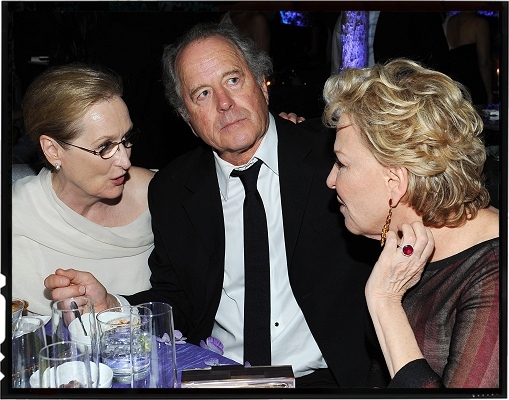
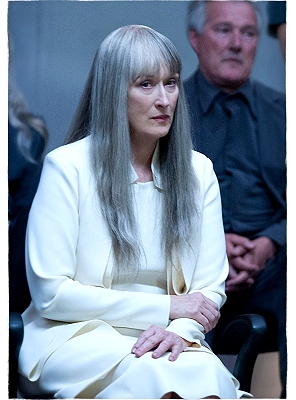

2014 saw three feature films lined up for Streep. The first was the motion picture adaptation of the young adult novel “The Giver”. Set in 2048, the social science fiction film tells the story of a post-apocalyptic community without war, pain, suffering, differences or choice, where a young boy is chosen to learn the real world. Streep, who plays the community’s leader, was aware of the book before being offered the role by co-star and producer Jeff Bridges. Upon its release, “The Giver” was met with generally mixed to negative reviews from critics, many being disappointed that the film didn’t match with the novel’s source materia. The same year, Streep also had a small role in Tommy Lee Jones’ western “The Homesman”. Set in the 1850s midwest, the film stars Jones and Hilary Swank as an unusual pair who help three women driven to madness by the frontier to get back East. The Homesman premiered at the 2014 Cannes Film Festival where it garnered largely positive reviews from critics. Upon its release, Tommy Lee Jones commented on Streep: “Meryl Streep needs no praise; she’s got plenty of it. She’s one of the finest movie actors in the history of cinema, and I’m very happy to call her a friend, because to be a friend of hers is another total joy.” Streep’s final film of 2014 was the Disney film adaptation of the Broadway musical Into the Woods, directed by Rob Marshall. A fantasy genre crossover inspired by the Grimm Brothers’ fairy tales, it centers on a hildless couple, who sets out to end a curse placed on them by a vengeful witch, played by Streep. Though the film was dismissed by some critics such as Mark Kermode as “irritating naffness”, Streep’s performance earned her Academy Award, Golden Globe, SAG, and Critic’s Choice Award nominations for Best Supporting Actress.
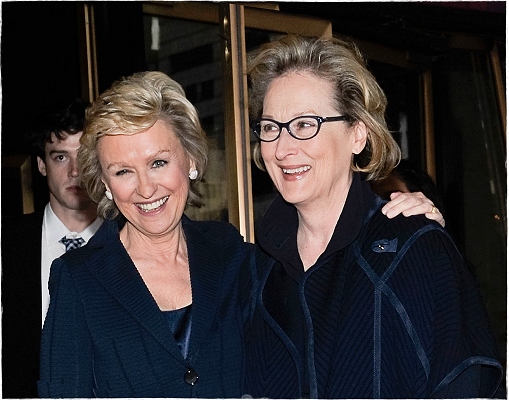
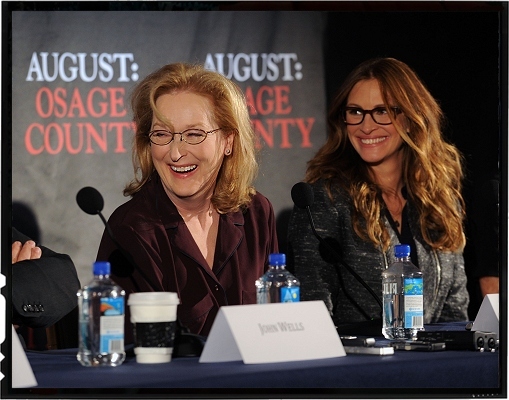

In 2013, Meryl Streep landed the leading role in the anticipated big screen adaptation of Tracy Lett’s Pulitzer Prize-winning play” August: Osage County”, about a dysfunctional family that reunites into the familial house when their patriarch suddenly disappears. Director John Wells gathered a wonderful ensemble around Streep’s towering mother: Julia Roberts, Ewan McGregor, Chris Cooper, Abigail Breslin, Benedict Cumberbatch, Juliette Lewis, Margo Martindale, Dermot Mulroney, and Julianne Nicholson. But “August” faced some rather odd decisions for its marketing. While the play was praised for its dark tone, the promotion for the film was lightened up and promoted as a light Christmas comedy in the tradition of “Home for the Holidays”. The overwhelming praise of Streep’s and Roberts’ involvement led critics to believe (and criticize) the film being merely a faithful adaptation of its source but rather an Oscar vehicle for its two stars. Both Streep and Roberts received Oscar nominations for their performances, but the reviews for the film were mixed. As Liam Lacey wrote for the Globe and Mail, “Although a couple of performances here may earn Oscar nominations, by the time you’ve sat through the wreckage, you’re left with the sense that this really must have worked better onstage.
The reason I did [August] was that a very dear friend said to me, ‘You had a great mother. She gave you your appetite for experience, curiosity, sense of humor. Your mother sang in the kitchen and mine hit me. Your mother made you feel you could do anything. Mine made me feel like I couldn’t do anything. You have to do this for me and for all the girls like me who had bad mothers, who made it in spite of that, who got out, and for all the ones who didn’t and to let them know it’s OK to leave that behind.’ She really made a case. I thought, OK, because when you’re a young actor, you think, oh yeah, it’ll be so cool to imagine having cancer and what’s it like to be close to death and then your family hates you…I really want to take that all on. (Meryl Streep, “August: Osage County” press conference, October 23, 2013)
“August: Osage County” premiered at the Toronto Film Festival to rather mixed reviews, with Meryl’s performance deemed “awards bait” in almost every review. The Los Angeles Times wrote, “the moment she stumbles on screen, face pale, hair shorn, voice slurred, you can picture academy members reflexively writing her name on their Oscar ballots. This is Acting”, while the London Evening Standard called Streep’s Violet a “an all-out performance, slurring voice and twisting features, worthy of Elizabeth Taylor in her heyday, if not a nightmarish Edith Evans”.
Most of Meryl Streep’s work through this year was off-camera. She narrated a series of documentaries, such as PBS’ “Makers: Women Who Make America”, “Pioneers of THIRTEEN: The ’70’s – Bold and Fearless”, the feature films “Girl Rising” and Disney’s Wings of Life” and audiobooks of Nora Ephron’s “Heartburn” and Colm Toibin’s Booker Prize short-listed novel “The Testament of Mary”.
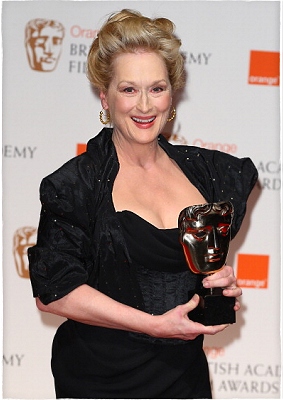
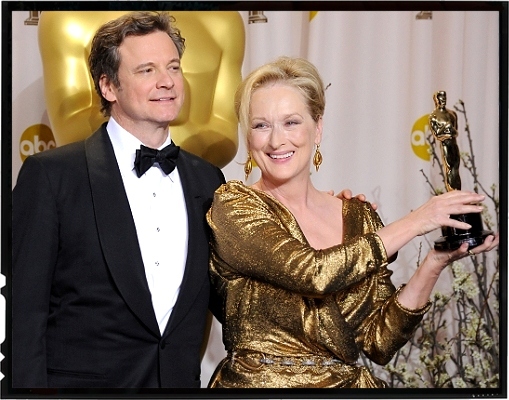

Although “The Iron Lady” had a limited release in December 2011 to qualify for awards season, the film widely released in January 2012. Streep promoted the film internationally in both London and Paris. In time for awards season, she was back in the United States, picking up the New York Film Critics Circle Awards and a Golden Globe Award. In February, she was honored with the BAFTA Award for Best Actress and then attended the Berlin Film Festival, for the German premiere of “The Iron Lady” and another honor – the Honorary Golden Bear for her work on film. On February 26, 29 years after winning her last Oscar, Meryl Streep received the Academy Award as Best Actress “The Iron Lady”. Her longtime collaborator, makeup artist Roy Helland, who has worked with Meryl since Sophie’s Choice, won an Academy Award as well that night, alongside Mark Coulier, for Best Makeup. In honor of her friend and colleague Viola Davis, it was later reported that Meryl made a donation to Davis’ Rhode Island connected charities. Commenting on her third Academy Award win, Streep said “I was a kid when I won this, like, 30 years ago. Two of the nominees were not even conceived. I thought I was so old and jaded, but they call your name and you just go into a sort of white light”.
In August 2012, “Hope Springs” released US theaters, sending Streep on yet another promotional tour. The film was received with positive reviews and favorable box office. The Hollywood Reporter wrote, “Streep’s performance is a winning mix of vulnerability and determination as she at first tries to understand her husband’s indifference and then works to convince him to help reignite their romantic spark. Several scenes where she attempts to reassert sexual intimacy with Arnold are both heartbreaking and hilarious, particularly a risqué rendezvous in a darkened, quiet theater where her unpracticed technique goes wrong in too many different ways.” Streep would receive another Golden Globe nomination for her performance.


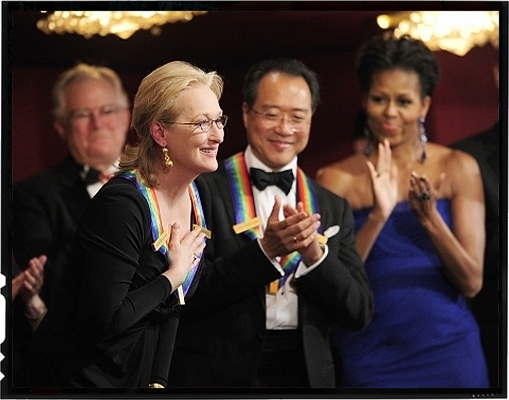
In February of 2011, Meryl Streep started filming what would be her most anticipated film role in a long time, and her most controversal one. She re-teamed with “Mamma Mia” director Phyllida Lloyd for a biopic on Margaret Thatcher called “The Iron Lady”, which takes a look at the Prime Minister during the Falklands War and her years in retirement. Streep, who sat through a session at the House of Commons to observe British MPs in action in preparation for her role, called her casting “a daunting and exciting challenge.” Former advisers, friends and family of Thatcher criticized Streep’s portrayal of her as inaccurate and biased and has been criticized by Thatcher’s children for putting the focus on her elderly years being heavily affected by Alzheimer’s disease.
The shooting of the film was heavily covered by British media, ranging from utter delight to utter hatress, depending on the newspapers’ political position. News from the filmmakers themselves came in bits and pieces, mostly quotes of Meryl’s co-stars, who praised her transformation and work ethics. Olivia Colman, who plays Carol Thatcher in the film, said, “It’s spooky, its proper spine-chilling spooky, it’s brilliant. Within moments I forgot that she was stratospherically wonderful… she’s a funny woman, who is very close to giggles at all times”. And Richard E. Grant, who plays Michael Heseltine, shared his experience of working with Meryl in a Daily Mail article. “We were doing a scene in which Mrs Thatcher walks down a corridor with a group of ministers. Between shots, Meryl, still suited and bewigged as Mrs T, sang the Abba hits. It was so incongruous and hilarious and it sums up her humour and sense of mischief. It’s naff to say it, but Meryl makes you feel better about yourself. As an actress, she’s the best of the best. But she’s also unbelievably down-to-earth. She knew everyone on the set by name. She’s appreciative of what other actors do. She has no entourage. It’s like working with a British theatre actress: very unexpected and disarming in someone who has 16 Oscar nominations and two Academy Awards in the bag”.
British distributor Pathé released a first promotional picture of Meryl in costume in February 2011, which, if this term existed already in 2011, went viral. American distributor TWC – famous then and infamous now for their marketing strategies – kept the film under wraps until the last moment and released it December 30 in New York City to qualifies for awards season. “The Iron Lady” received mixed reviews for its botched execution and Lloyd’s rather odd, operatic direction. But despite the criticism, Streep’s performance in the title role garnered much critical acclaim and awards. The film’s release was heavily promoted in the United States and United Kingdom, and made a whopping $115 million in ticket revenues. On December 27, 2011, Meryl Streep was among the honorees of the 34th Annual Kennedy Center Honors, marking the start of a very extensive, very successful awards run in 2012.
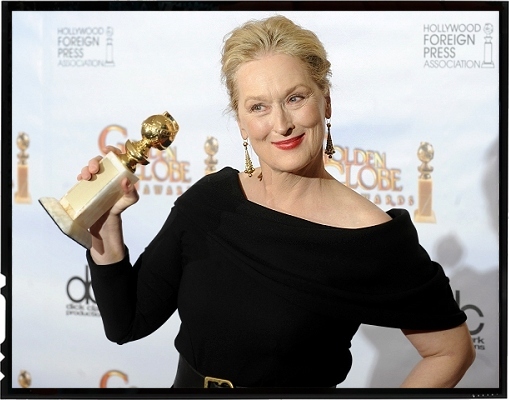
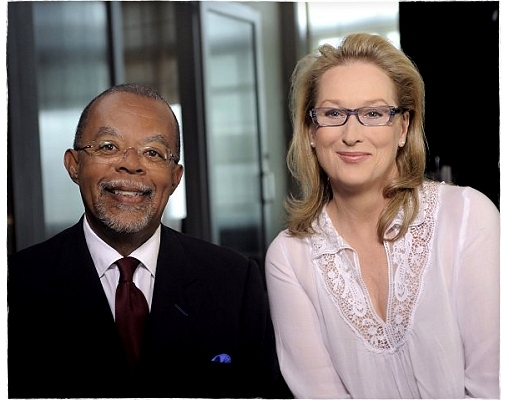

While the dawn of the new decade kept Meryl Streep busy attending awards ceremonies as a nominee for “Julie & Julia”, she kept a rather low profile this year as she did 10 years ago. Among her appearances that year was her online debut in Lisa Kudrow’s web series “Web Therapy”, which late moved to Showtime. In three episodes, Streep played Kudrow’s sexual orientation / conversion therapist Camilla Bowner, whose latest client happens to be Fiona’s husband. She also appeared on the television programme “Faces of America with Henry Louis Gates Jr.”, in which she traced her family tree – they found Streep is descended from people who lived in the small German town of Loffenau and also from Switzerland and from Quakers, who were among the first to settle in America.
While there was no feature film released this year, three big projects were announced that would bring Streep further recognition in the coming years: MGM announced “Great Hope Springs”, to be directed by Mike Nichols, a drama comedy about an estranged couple in therapy. The project would shape into “Hope Springs” with Nichols being replaced by “The Devil Wears Prada” director David Frankel and Jeff Bridges being replaced by James Gandolfini and then Tommy Lee Jones. Also announced were “The Iron Lady”, with Streep portraying the British Prime Minister in the days leading up to the Falklands War in 1982 as well as the screen adaptation of “August: Osage County”.
My success has depending wholly on my putting things over on people, so I’m not sure that parents think I’m that great a role model anyway. I am however an expert in pretending to be an expert in various areas. Just randomly, like everything else in this speech, I am an expert in kissing … river rafting, miming the effects of radiation poisoning, knowing which shoes go with which bag, coffee plantationing, Polish, German, French, I-talian – that’s Iowa-talian, from “the Bridges of Madison Country,” bit of a brogue, bit of the Bronx – Aramaic, Yiddish, Irish clog dancing, cooking, singing, horse riding, knitting, playing the violin and simulating steamy sexual encounters. These are some of the areas in which I have pretended quite [successfully to be proficient in] … as have many women here, I’m sure. (Meryl Streep, Barnard College Commencement, May 17, 2010)
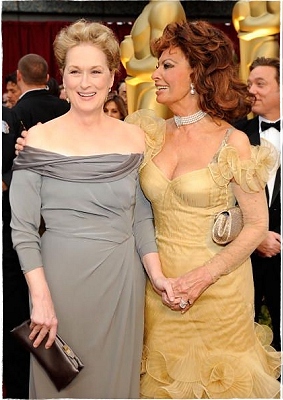
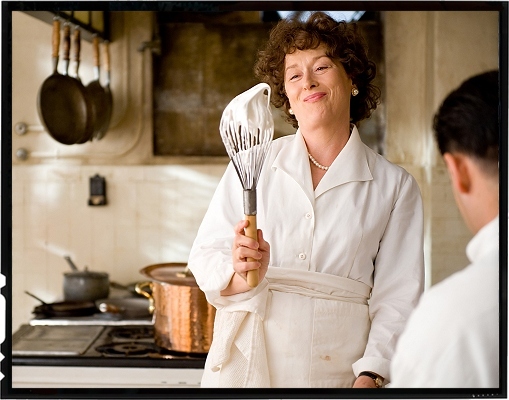

After a constant stream of celebrated performances throughout the decade, Meryl Streep finished the 2000s with two additional performances that would become fast fan favorites, and critical darlings. She starred in Nora Ephron’s last film “Julie & Julia”, based on Julie Powell’s best selling book by the same name, as the larger-than-life Julia Child. The comedic and heartfelt performance earned her yet another Golden Globe – the fourth within this decade – a Critics Choice Award, New York Film Critics Circle Award and nominations for the Screen Actors Guild Award and BAFTA Film Award. Receiving glowing reviews, and despite its limited appeal to mainstream moviegoers, “Julie & Julia” made $129 million at the box office on a $40 million budget.
Streep’s box office success was even topped with Nancy Meyers’ very grown-up and very funny romcom “It’s Complicated”, in which Meryl’s character, a divorcee and recent empty-nester, is caught between newfound affection for the architect she has hired to remodel her home, and rather warmed up affection from her ex husband who regrets their separation. Co-starring Steve Martin and Alec Baldwin, the film received favorable reviews but a strong reception at the box office, grossing over $224 million during its Christmas release. For her performance, Streep received yet another Golden Globe nomination – and, ironically, lost to herself for “Julie & Julia”.



